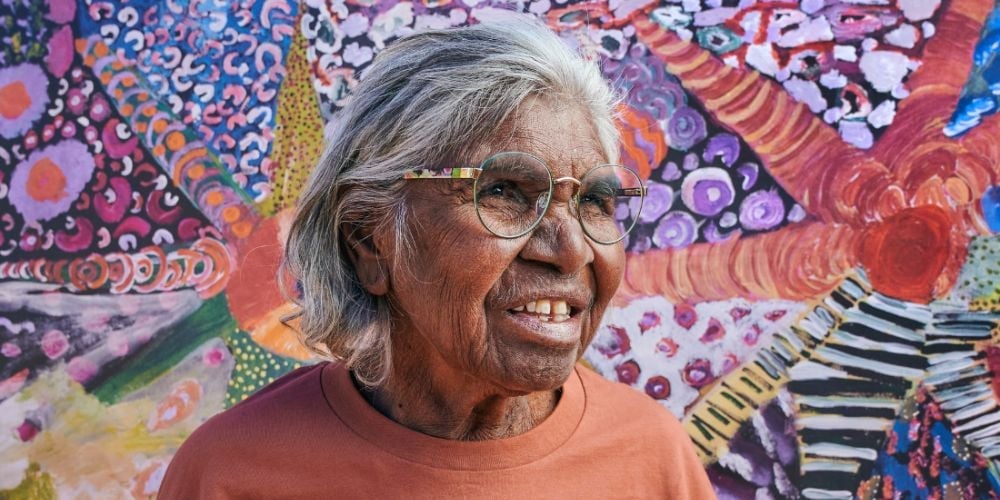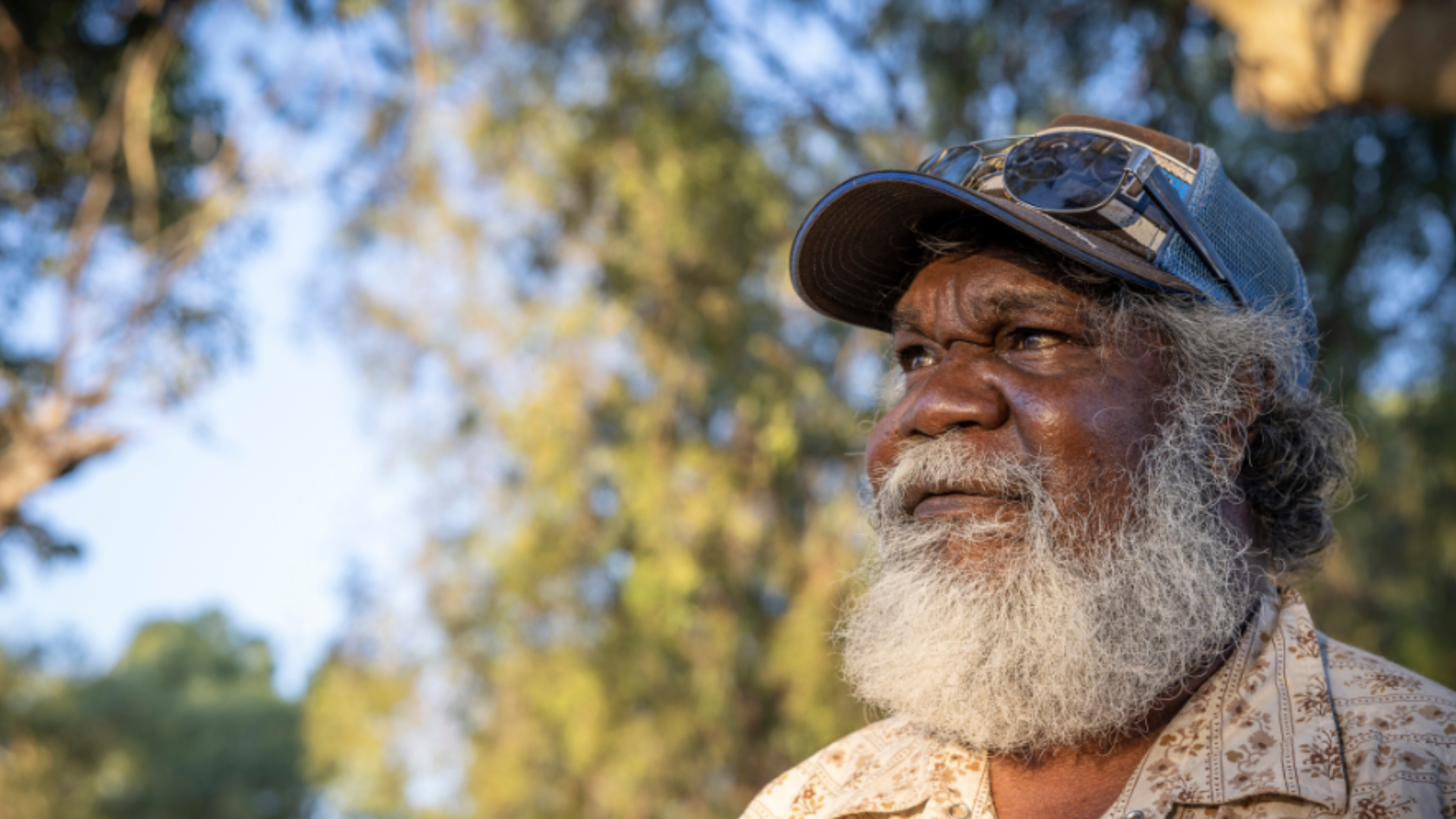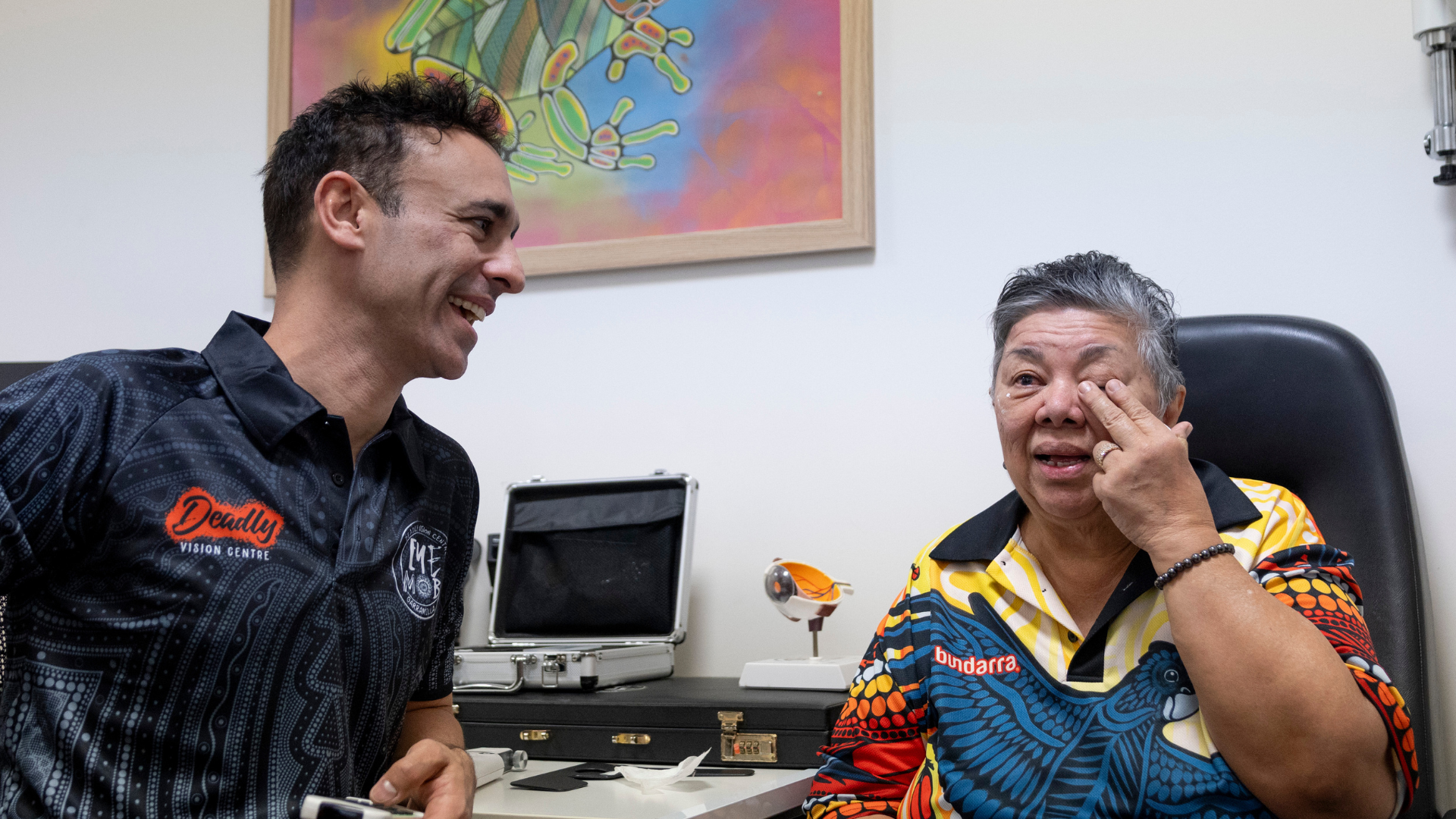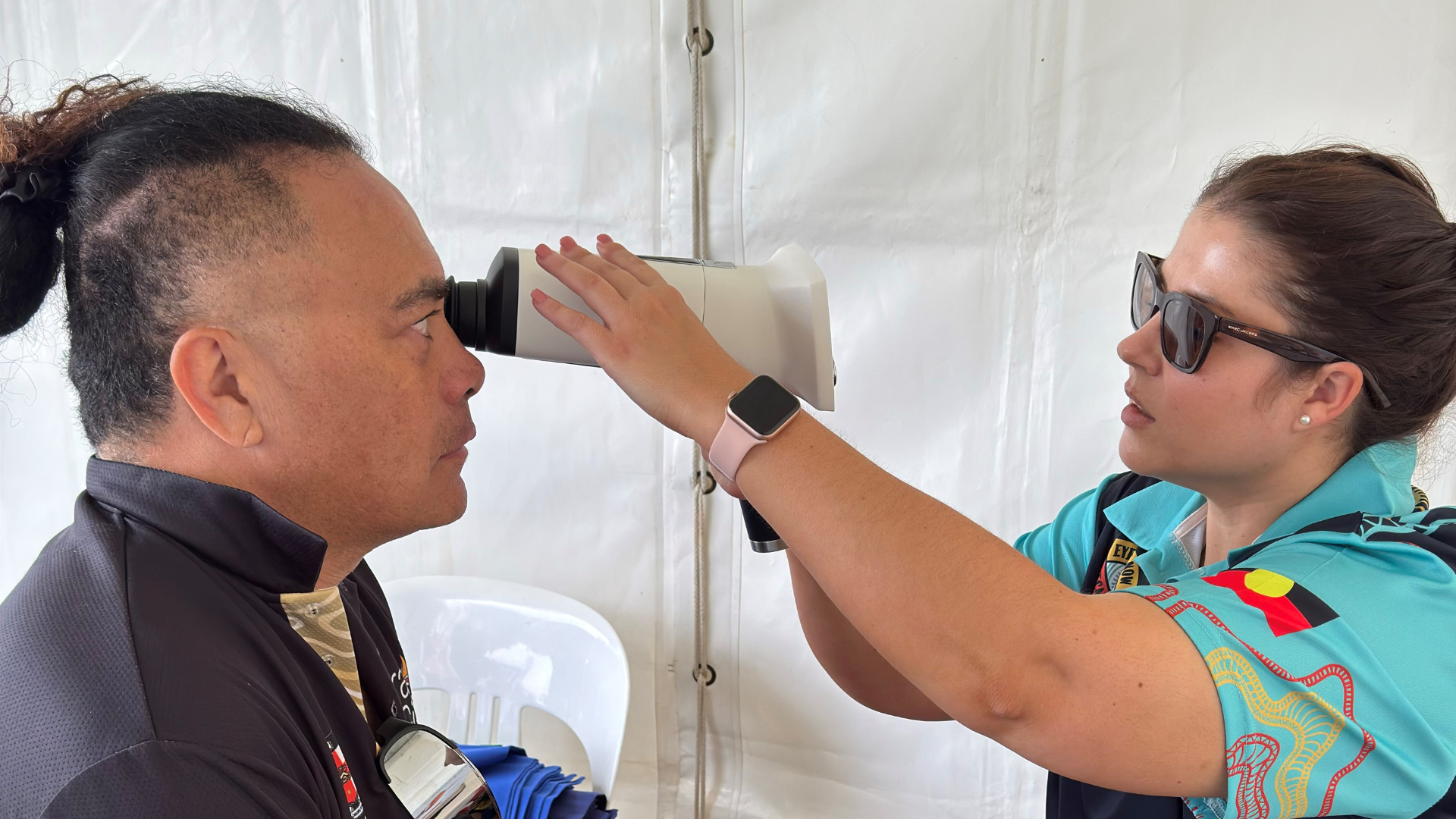Indigenous Australia
Specsavers limited edition frames: Helen Dale Samson

Aboriginal and Torres Strait Islander Peoples are three times more likely to go blind from treatable causes than other Australians. That’s why, every year, Specsavers donates $25 from each pair of limited-edition frames to The Fred Hollows Foundation. This year, Helen Dale Samson’s artwork, ’Puntawarri’ features on the new limited-edition frames.
Now in its 8th year, the Limited-Edition Frames Campaign is a yearly initiative run by Specsavers to promote the work of Aboriginal or Torres Strait Islander artists and to raise funds for The Fred Hollows Foundation.
$25 from each frame will be donated to The Fred Hollows Foundation’s work in Australia to restore sight, improve access to eye health care and build a workforce of Aboriginal and Torres Strait Islander people to deliver culturally appropriate care.
The limited-edition frames feature distinctive designs, patterns, or colours, which are taken from the chosen artist’s artwork. This year, Helen Dale Samson’s artwork, ’Puntawarri’ features on the new limited-edition frames.
Helen Dale Samson is a Warnman woman and custodian of the Karlamilyi (Rudall River) region in Western Australia, where her family travelled during the pujiman (tradional, desert dwelling) era. She is the youngest sister of fellow Martumili Arsts Jatarr Lily Long and Wurta Amy French, but unlike her sisters, she was born in Jigalong Mission and has no memory of her parents.
Recently, with the help of The Foundation’s program partner, Lions Outback Vision, Helen was able to receive sight restoring cataract surgery, telling Martumili staff that she can now, “see everything”.
Dale has established a reputation as a dedicated and innovative painter and weaver. She paints about the old mission days and the places she and her ancestors travelled, along with their associated Jukurrpa (Dreaming) stories. Dale’s vibrant paintings meld a native Western style with unique, textured motifs and multiple perspectival views of her Country. She is particularly adept at describing the gorgeous array of flora that covers Martu Country, abstracting flowers and trees into beautiful patterns.
$25 from each frame will be donated to The Fred Hollows Foundation’s work in Australia to restore sight, improve access to eye health care and build a workforce of Aboriginal and Torres Strait Islander people to deliver culturally appropriate care.
The limited-edition frames feature distinctive designs, patterns, or colours, which are taken from the chosen artist’s artwork. This year, Helen Dale Samson’s artwork, ’Puntawarri’ features on the new limited-edition frames.
Helen Dale Samson is a Warnman woman and custodian of the Karlamilyi (Rudall River) region in Western Australia, where her family travelled during the pujiman (tradional, desert dwelling) era. She is the youngest sister of fellow Martumili Arsts Jatarr Lily Long and Wurta Amy French, but unlike her sisters, she was born in Jigalong Mission and has no memory of her parents.
Recently, with the help of The Foundation’s program partner, Lions Outback Vision, Helen was able to receive sight restoring cataract surgery, telling Martumili staff that she can now, “see everything”.
Dale has established a reputation as a dedicated and innovative painter and weaver. She paints about the old mission days and the places she and her ancestors travelled, along with their associated Jukurrpa (Dreaming) stories. Dale’s vibrant paintings meld a native Western style with unique, textured motifs and multiple perspectival views of her Country. She is particularly adept at describing the gorgeous array of flora that covers Martu Country, abstracting flowers and trees into beautiful patterns.
“All around is sandhills and lakes on every side. You can see the grass, but the lakes are all dry. In the middle is Puntawarri waterhole. That's the jila (snake) place, two jila. They nyupa (spouses), they darlings, man and woman. They sleeping near to Puntawarri. It's a hole in the ground- that jila will come out of the ground and all the dust will go everywhere. All the dust going everywhere, the dust that flies up when the jila flies up out of its hole. The jila isn't in that place anymore. It's gone now but that jila used to stop there.”
Puntawarri is an important cultural area located on the middle stretches of the Canning Stock Route and east of the Jigalong Mission (now Jigalong Aboriginal community) in Western Australia. It is also the site of an abandoned community, a waterhole, creek and lake. Puntawarri’s close proximity to Jigalong Mission made it a popular site for Martu to visit during the ‘mission days’. Dale was born at Jigalong Mission, and continues to live in the community now located there today. Though she grew up in the dormitory at Jigalong, she spent her weekends and holidays in the bush, camping at sites such as Puntawarri with her extended family. Once married, she lived around Puntawarri, walking and hunting in the surrounding Country.
Throughout our 12-year partnership, Specsavers has been a strong supporter of The Foundation’s Indigenous Australia Program, having donated more than $6 million towards the goal of closing the gap in Aboriginal and Torres Strait Islander eye health.
Specsavers supports the work of The Foundation in several ways, from donations, workplace giving activities, skilled and unskilled volunteering, but also through eye health equipment donations to support Aboriginal Health Services. Being an optical retailer, as well as the nation’s leading eye health provider, this partnership is the perfect example of a business taking responsibility within its sector.
The Fred Hollows Foundation is incredibly grateful for the support of Specsavers in working to make a difference in the lives of Aboriginal and Torres Strait Islander Peoples.
Discover the Specsavers limited-edition collection, available exclusively in-store and online at Specsavers.com.au with $25 from the purchase of each frame going to The Fred Hollows Foundation.
Throughout our 12-year partnership, Specsavers has been a strong supporter of The Foundation’s Indigenous Australia Program, having donated more than $6 million towards the goal of closing the gap in Aboriginal and Torres Strait Islander eye health.
Specsavers supports the work of The Foundation in several ways, from donations, workplace giving activities, skilled and unskilled volunteering, but also through eye health equipment donations to support Aboriginal Health Services. Being an optical retailer, as well as the nation’s leading eye health provider, this partnership is the perfect example of a business taking responsibility within its sector.
The Fred Hollows Foundation is incredibly grateful for the support of Specsavers in working to make a difference in the lives of Aboriginal and Torres Strait Islander Peoples.
Discover the Specsavers limited-edition collection, available exclusively in-store and online at Specsavers.com.au with $25 from the purchase of each frame going to The Fred Hollows Foundation.
COVER PHOTO CREDIT: Michael Amendolia
Related articles
View these articles

The Fred Hollows Foundation Treaty Support Statement - Victoria
We believe a better tomorrow is possible. That’s why The Fred Hollows Foundation pledges our unwavering support for the Treaty process in Victoria.

What is cultural safety and why does it matter in eye health care?
Cultural safety is a cornerstone of effective eye health care, ensuring that it is safe, respectful, and inclusive for Aboriginal and Torres Strait Islander peoples. But what exactly is cultural safety, what does it have to do with eye health, and how is The Fred Hollows Foundation working to increase culturally safe health practices?

Koori Knockout raises eye health awareness among thousands on World Sight Day
World Sight Day shines a spotlight on the importance of eye care, especially for young people. This year, the Koori Knockout in Bathurst, NSW — one of the largest annual gatherings of Indigenous peoples in the southern hemisphere — served as an ideal platform for raising awareness about eye health.
